

Searchingforscience / Scientific Search engines. When searching for scientific information, standard search engines hardly ever suffice, since most interesting scientific information is locked in databases not covered by the ordinary web search engines.
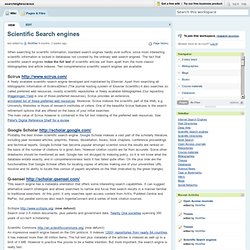
The fact that scientific search engines index the full text of scientific articles set them apart from the more classic bibliographies and article indexes. Two comprehensive scientific search engines are available. Scirus A freely available scientific search engine developed and maintained by Elsevier. Apart from searching all bibliographic information of ScienceDirect (The journal hosting system of Elsevier Scientific) it also searches so called preferred web resources, mostly scientific repositories or freely available bibliographies (Our repository Wageningen Yield is one of those preferred resources). Searchingforscience / Scientific Directories. Directories were the first navigation tools on the web.
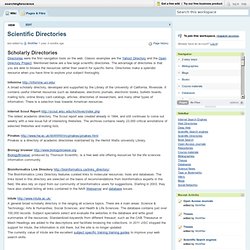
Classic examples are the Yahoo! Directory and the Open Directory Project. Mentioned below are a few large scientific directories. The advantage of directories is that you are able to browse the resources rather than search for specific items. Directories make a splendid resource when you have time to explore your subject thoroughly. Infomine A broad scholarly directory, developed and supported by the Library of the University of California, Riverside.
Internet Scout Report The oldest academic directory. Pinakes Pinakes is a directory of academic directories maintained by the Herriot Watts university Library. Biology browser BiologyBrowser, produced by Thomson Scientific, is a free web site offering resources for the life sciences information community. Bioinformatics Link Directory The Bioinformatics Links Directory features curated links to molecular resources, tools and databases. Intute home. Searchingforscience / Open Access Journals. Wageningen UR library offers a comprehensive set of electronic journals.
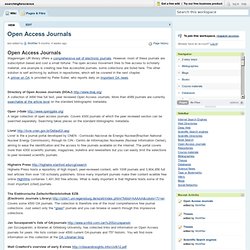
However, most of these journals are subscription based and cost a small fortune. The open access movement tries to free access to scholarly material, one example is creating new free accessible journals, some collections are listed here. The other solution is self archiving by authors in repositories, which will be covered in the next chapter. A primer on OA is provided by Peter Suber, who reports daily on important OA news. Directory of Open Access Journals (DOAJ) A collection of 9490 free full text, peer reviewed Open Access Journals. Searchingforscience / Theses. The pinnacle of one's early scientific output is one's dissertation or thesis.
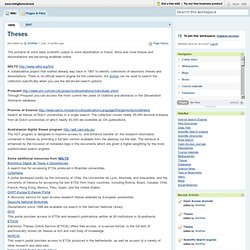
More and more theses and disseratations are becoming availbale online. NDLTD A collaborative project that started already way back in 1987 to identify collections of electronic theses and dissertations. There is no official search engine for the collections, but Scirus can be used to search the collection specifically when you use the advanced search options. Proquest Through Proquest you can access the most current two years of citations and abstracts in the Dissertation Abstracts database. Promise of Science Search all theses of Dutch universities in a single search. Australasian digital theses program The ADT program is designed to improve access to, and enhance transfer of, the research information contained in theses by providing a full text version available from the desktop via the web. Some additional resources from NDLTD Biblioteca Digital de Teses e Dissertacoes.
Athenus - The Engineering and Science Search Engine : Home. Scientific Search Engine - www.OJOSE.com - Online JOurnal Search Engine - Where science meets the web :-) Q-Sensei. Searchingforscience / Scientific Search engines. Home - SCIRUS: Scientific Search Engine - Library Research Guides at University of Massachusetts Boston. Academic search engines: librarian's friend, researcher's delight. Chakravarty, Rupak and Randhawa, Sukhwinder Academic search engines: librarian's friend, researcher's delight., 2006 .
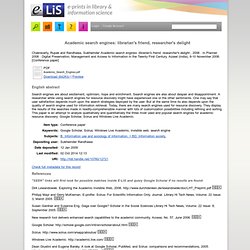
In Planner 2006 : Digital Preservation, Management and Access to Information in the Twenty First Century, Aizawl (India), 9-10 November 2006. [Conference paper] English abstract Search engines are about excitement, optimism, hope and enrichment. Search engines are also about despair and disappointment. References "SEEK" links will first look for possible matches inside E-LIS and query Google Scholar if no results are found. ACADEMIC SEARCH ENGINES : LIBRARIAN’S FRIEND, RESEARCHER’S DELIGHT. 498better way through a co-operative approach.
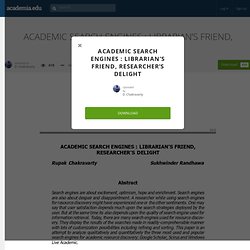
Search should have the potential to make the invisibleweb visible to the researchers and that too without much complexity. The major partners of such acooperative effort are the commercial search engines, libraries and the database vendors. Theirrole and strength can be seen as under:Commercial search enginesTechnological and financial superiority, continuous development andinnovation.LibrariesGreat knowledge assets and facilitators of knowledge. They havealready developed complex instruments for information organization(e.g. thesauri, classification, taxonomies) which could be highlyvaluable for end-user searching, automatic indexing, ontologybuilding and classification of academic content.Publishers and databaseHuge database of academic contentvendors. CERN Document Server. Google Scholar.